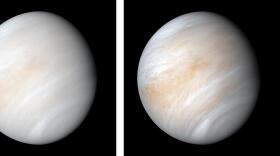
Are We There Yet?
New episodes every Tuesday
A podcast about humanity’s next giant leap into space.
There’s a lot going on up there—and 'Are We There Yet?' is your guide to it all. Hosted by space reporter Brendan Byrne, this weekly podcast takes you inside the latest developments in space exploration, from NASA missions to commercial spaceflight.
What You’ll Hear
- Deep Space Missions – NASA’s efforts to return to the Moon and journey toward Mars.
- Solar System Science – Probes and rovers uncovering the secrets of planets, moons, and beyond.
- Space Industry Insights – How private companies are reshaping the future of exploration.
- Human Stories – Interviews with astronauts, engineers, and visionaries pushing boundaries.
Why Listen?
Are We There Yet? connects you to the people and ideas behind humanity’s boldest adventure. Whether you’re fascinated by rocket launches, curious about space science, or inspired by the dream of becoming an interplanetary species, this podcast brings the universe a little closer to home.
Ways To Subscribe
Latest Episodes
-
Under the Trump administration the space agency has been undergoing policy changes as it prepares for future missions and goals, like putting a nuclear power plant on the moon. The new budget proposed may be problematic. Plus, a new executive order lifts some launch and flight regulations for commercial space companies.
-
Veteran NASA Astronaut Winston Scott fields questions from curious kids. Plus, a look at how food plays a crucial role in space in the book Space Bites.
-
From making artificial moon dirt to painting with real moon dust, there are several ways that scientists and space explorers bring the moon to Earth. Plus, Firefly Aerospace is preparing to send several payloads to the moon.
-
Co-hosts, Regina Barber and Emily Kwong, explore Earth's oceans in a special series running this summer from NPR’s science podcast, Short Wave: Sea Camp. Plus, a look at the commercial space company sector.
-
A new proposal suggests sending a spacecraft to Venus to search for gases that are often linked to biological cycles here on Earth. Plus, a look at veteran Canadian astronaut Roberta Bondar's book Space for Birds: Patterns and Parallels of Beauty and Flight.
-
The Trump Administration named Sean Duffy, Secretary of Transportation, to be the interim NASA administrator. Plus, could life exist in an icy ocean on a distant moon within our solar system.
-
Catching up on your summer reading list? How about adding one more -- a science fiction thriller series set in space? Plus, a new company is taking their design process off Earth and designing sneakers in space using AI designers and 3D printing.
-
A new observatory in Chile, the Vera C. Rubin Observatory, is searching the skies for things like asteroids, dark matter and dark energy. What new things might it uncover about the cosmos? Plus, the rovers on Mars are exploring two craters that have evidence of past water. Could they also be home to ancient life? lead scientists closer to finding out if Mars had water flowing on its surface.
-
With warmer weather and more free time for some, summer is a time to relax, unwind and to stargaze. Plus, another way to unwind is by reading space books like Star Bound: A Beginner's Guide to the American Space Program, from Goddard's Rockets to Goldilocks Planets and Everything in Between
-
Astronomers have discovered an object light-years away that’s emitting timely pulses like nothing ever seen before. Plus, the next private space crew is grounded. How are they dealing with the delay?
-
-
A budget proposal from the White House would cut about a quarter of NASA’s budget and cut key science missions if approved by Congress. Plus, President Trump withdrew his nomination of Jared Isaacman for NASA administrator and SpaceX once again launched its massive Starship rocket.












